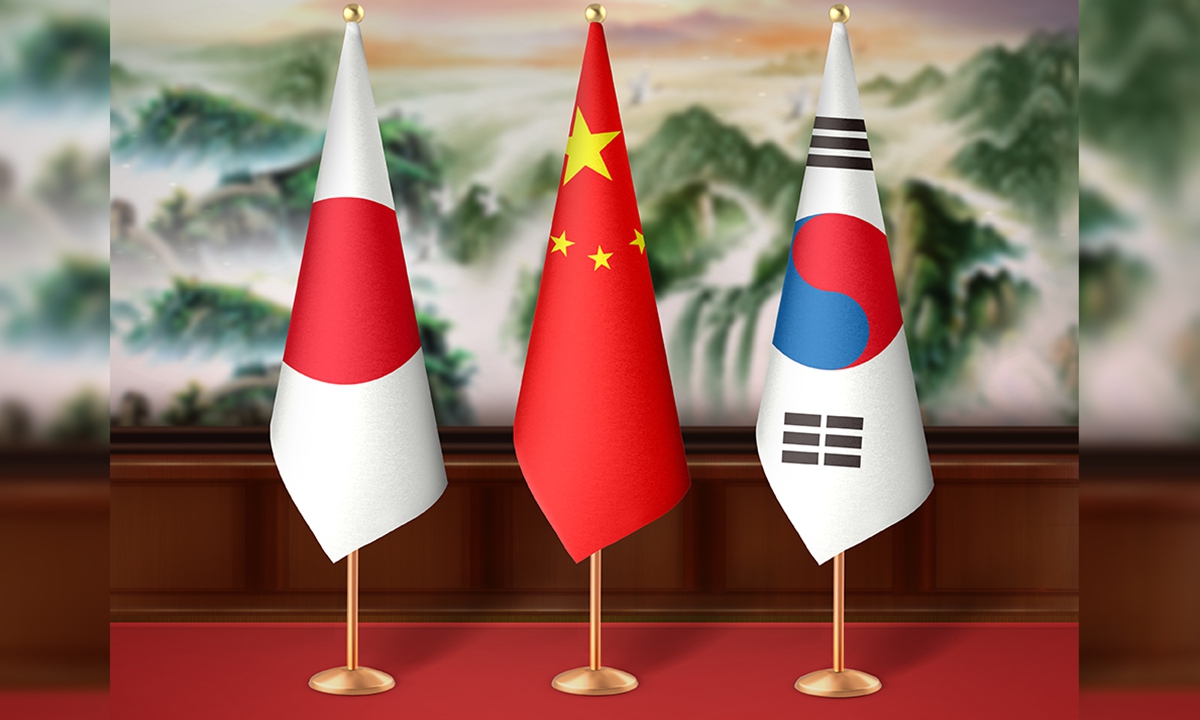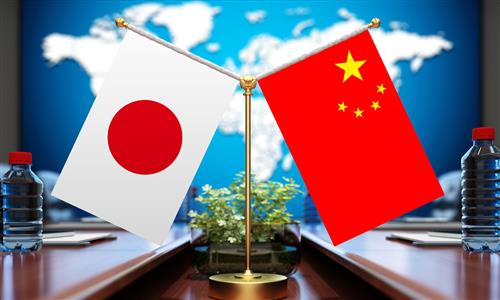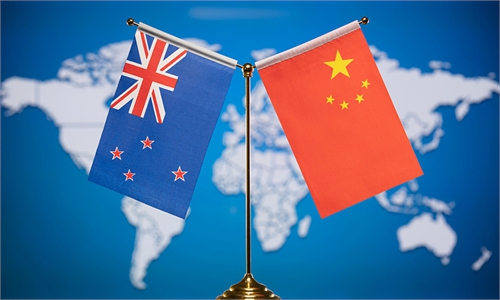
Flag of China, Japan, and South Korea. Photo: VCG
Top trade officials from China, Japan and South Korea exchanged in-depth views on the enhancement of trade and investment cooperation, regional and multilateral cooperation on Sunday, and reached a broad consensus during the 13th Trilateral Economic and Trade Ministers' Meeting among China, Japan and South Korea held in Seoul, China's Ministry of Commerce (MOFCOM) said.
Chinese Minister of Commerce Wang Wentao co-chaired the meeting with South Korean Industry Minister Ahn Duk-geun and Japanese Minister of Economy, Trade and Industry Yoji Muto. It marked the first time since December 2019 that the industry ministers of the three nations held a trilateral meeting.
The resumption of trilateral communication augurs well for charting the further development path for the three sides to enhance economic cooperation, which will also enhance regional integration, an expert said.
The meeting represented another important interaction between senior officials of the three major Asian countries. On March 22, Member of the Political Bureau of the CPC Central Committee and Foreign Minister Wang Yi jointly attended the 11th China-Japan-ROK Trilateral Foreign Ministers' Meeting with Japanese Foreign Minister Takeshi Iwaya and Foreign Minister of the Republic of Korea Cho Tae-yul in Tokyo, noting that it could deepen economic and trade cooperation and strengthen its role as the "ballast stone."
The Sunday meeting took place as the US announced plans to impose 25-percent auto tariffs starting on April 2. With the increase of external unilateral moves, the trilateral meeting points the direction for the three sides to further utilize their respective strengths in the field of economic cooperation to jointly resist the turbulence brought by the US' irresponsible approach, an analyst said, noting that the consensus to deepen economic and trade cooperation reached by the meeting will inject stability into the world.
Call for cooperation
During the meeting, Wang Wentao noted that the economic and trade departments of the three countries agreed to strengthen cooperation under regional and multilateral frameworks such as the WTO, RCEP and APEC, discuss accelerating the negotiations on the China-Japan-South Korea Free Trade Agreement (FTA), strengthen supply chain cooperation and dialogue on export control, as well as deepen cooperation on the digital and green economies.
"The resumption of trilateral high-level economic communication sends a good signal, charting the future development path for the three sides to enhance economic cooperation," Lü Chao, an expert on East Asian studies at the Liaoning Academy of Social Sciences, told the Global Times on Sunday.
Noting the acceleration of the Trilateral FTA, Chen Zilei, director of the Research Center for Japanese Economics at the Shanghai University of International Business and Economics, said that the move will further promote the liberalization and facilitation of investment and trade among the three countries, and promote regional integration, which is an important initiative to address the current situation.
Lü noted that the US' tariff stick is affecting every country in the world. Under such circumstances, how the three countries can stick together and ride out the difficulties is a key issue.
According to Bloomberg, both South Korea and Japan are major exporters of cars to America. The US is also expected to announce so-called reciprocal tariffs, potentially affecting sectors including semiconductors and pharmaceuticals. Any impact to chip sales would be particularly damaging for South Korea, given they remain a key driver of growth for the export-reliant nation.
"Strengthening economic cooperation can further resist the global uncertainty brought by the US' unilateralist approach and in particular, China, Japan and South Korea can further utilize their respective strengths for economic cooperation," Lü said.
For instance, China and Japan can enhance cooperation in the automobile industry. In the past, Japanese automobiles have depended hard on the US, and now they may turn to the Asia-Pacific to explore diversified markets. China and South Korea see promising cooperation in the field of electronics and semiconductors, Lü noted.
Promoters for multilateralism
During Sunday's high-level meeting, Wang Wentao noted that China, Japan and South Korea, as important economies in the region and the world, should jointly safeguard free trade and the multilateral trading system, oppose unilateralism and protectionism, and continue to push forward regional economic integration, so as to inject strong impetus into the prosperity and development of the world economy.
According to a joint media statement after the meeting released by MOFCOM, the three countries support a rules-based, open, inclusive, transparent, non-discriminatory multilateral trading system with the WTO at its core.
Chen noted that the three countries, acting as a locomotive for economic development in the Asia-Pacific region, have sent voices in support of multilateralism and free trade to the world, and the consensus to deepen economic and trade cooperation reached by the meeting has practical significance.
In a way, the US' tariff shock will instead accelerate the process of regional integration, with countries in the region cooperating more closely in trade, investment and industry, as is the case in the EU, and also in Asia, Chen said.
"Under these circumstances, I believe that the China-Japan-South Korea trilateral cooperation mechanism can provide an example for regional collaboration in the international community, injecting stability into the world," Lü said.
Notably, China has always been proactive in promoting multilateral cooperation- contrasting with the US' more protectionist "America First" policies, Chen said.
China is unswervingly promoting high-quality development and expanding high-level opening-up, and is willing to share development opportunities with all countries in the world, including South Korea and Japan, China's Minister of Commerce said during the Sunday's meeting.



